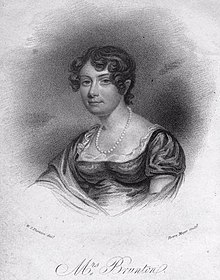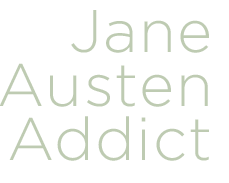[reprinted here with the kind permission of The Jane Austen Centre, celebrating Bath’s most famous resident and reporting the latest Austen-related news. ]
If Mary Brunton’s name rings any bells, you are most likely thinking of this quote from Jane Austen:
I am looking over Self Control again, & my opinion is confirmed of its’ being an excellently-meant, elegantly-written Work, without anything of Nature or Probability in it. I declare I do not know whether Laura’s passage down the American River, is not the most natural, possible, every-day thing she ever does.
The alleged lack of ‘Nature or Probability’ has since cast a long shadow on Brunton’s work:
 in fact, it seems to have become the accepted critical opinion, so much so that Brunton tends to be accused of faults she did not even have. Before I read Self-Control (1811) and Discipline(1814), I therefore assumed the novels were over-the-top in a wildly sentimental, Gothic fashion. (Several academic texts and reference works I’ve since looked at operate under the same illusion, which is making me wonder whether most academics actually read the books they write about.) I really should have paid more attention to the titles – whoever would give a sentimental potboiler such a forbidding title as Self-Control?
in fact, it seems to have become the accepted critical opinion, so much so that Brunton tends to be accused of faults she did not even have. Before I read Self-Control (1811) and Discipline(1814), I therefore assumed the novels were over-the-top in a wildly sentimental, Gothic fashion. (Several academic texts and reference works I’ve since looked at operate under the same illusion, which is making me wonder whether most academics actually read the books they write about.) I really should have paid more attention to the titles – whoever would give a sentimental potboiler such a forbidding title as Self-Control?
What made the novel so unrealistic to her contemporaries was not a rollercoaster of a plot but its heroine, Laura Montreville, whom the Critical Review dubbed a ’saint in petticoats’ whose ’spiritual pride is insufferable, and her language nothing but Evangelical cant’. Brunton was an unapologetic Methodist, and many thought of her novels as (in the words of the Critical Review again) ’methodistical palavering‘. Not everyone agreed*, but religious ‘cant’ was far from fashionable at the time – as the author herself recognises when her thoughtless minor characters use the word ‘methodistical’ as an insult.
The charge of religious overkill is justified
– even more so in the case of Discipline – but I think looking at the works as Methodist propaganda does them as little justice as judging them for over-the-top sentimentality. What makes Brunton interesting is how she uses sentimental tropes and titillating plot-twists to her own moral ends, to the point of being accused of plagiarising her 18th-century predecessors in Self-Control. This kind of fiction can be dangerous, as demonstrated by a minor character – ‘Having no character of her own, Julia was always, as nearly as she was able, the heroine whom the last read novel inclined her to personate’ – but as it undoubtedly has a power, could not this power be harnessed to do good?
The plot of Self-Control is fairly simple, but very readable:
Laura Montreville is a beautiful and well-born, but poor, girl from the Scottish Highlands. (She is also as prim and proper as a room full of Carmelite nuns, but I think we can forgive her as she makes a joke of her ‘formality’ herself.) She is pursued by Colonel Hargrave, an attractive libertine whose intentions are no good; and not knowing any better, poor Laura falls in love. He offends her with an indecent proposal, realises his mistake, and makes her an offer of marriage – a pretty good offer, all things considered, but Laura declines, citing moral and religious incompatibility. She declares she will marry him at the end of two years, if he has in the meantime reformed his wicked ways and contemplated the Bible. (Unrealistic? You decide.) He says yes, but has no intention of waiting that long – and Laura suffers impoverishment, illness, and humiliating dependence, all the while tormented by Hargrave, who gradually morphs from an overwhelmingly passionate pest to an insensitive jerk, and finally to a downright villain.
Despite the heroine’s saintliness, Self-Control contains a fair amount of psychological realism.
(I said psychological, all right? The bizarre finale involving canoes and waterfalls does not count. I still don’t know what Brunton was thinking when she thought it was a good idea to… ah, well. No spoilers!) Reacting against a long tradition of sentimental romances, Brunton strips away Laura’s romantic illusions, though at the same time acknowledging their power; Laura isn’t duped through her own stupidity or moral failure, and she later finds it quite realistically difficult to fall out of love with Hargrave, even when she realises he’s not worth it. Brunton is also shrewd enough to realise that you will not convert anyone if you strip away every attractive illusion and leave nothing but resignation and self-denial in their place. Laura is thus rewarded with a new, improved lover – and when I say ‘improved’, I mean ‘a bit priggish perhaps, but adorable in a geeky sort of way’.
P lot-wise, Discipline is a different animal altogether:
lot-wise, Discipline is a different animal altogether:
narrated as the heroine’s spiritual autobiography, it is one part a novel of education (spoilt girl learns to be… er, less spoilt), and two parts a female Pilgrim’s Progress, with only a pinch of romance on top. Ellen Percy is a young, beautiful heiress – infuriatingly selfish and thoughtless, and because of her pride prone to mistreat the worthiest people, i.e. Miss Mortimer, her deceased mother’s suitably saintly Methodist friend, and Mr Maitland, an equally moral Methodist Highlander who falls in love with her against his better judgment. (There must be something in the Highland water to contribute to moral uprightness and high religious principles, or else the Scots are simply a superior race.) After much fashionable frivolity in London, treacherous friends, and one near-seduction, Ellen suddenly finds herself friendless and penniless: her father has gone bankrupt and committed suicide. Miss Mortimer takes her under her wing; but she too is poor and mortally ill, and cannot help her for long. Ellen then gets a job as a governess, but despite her best efforts she is unable to resist the downward spiral in which her pride and selfishness are brutally knocked out of her.
Both novels are studies of the truly religious frame of mind, and often very timely
– Discipline refers to the anti-slavery movement, the sabbath-breaking controversy, and the concept of the deserving poor, for example, all of them pressing questions of the religious revival. More interesting to a modern reader is the intense self-examination that drives both novels: both Laura and the post-reformation Ellen constantly question their own motives, and though my description has doubtless rendered the novels unappetising to many, the overall effect is not of ‘A Guide to Being a Good Christian and Obeying Patriarchal Rules’, but of ‘How and When to Trust Your Own Judgment, Even If You’re a Feeble Female and Everybody Else Is Telling You You’re Wrong’. Strangely (or not?), by trusting the Providence above all Laura and Ellen learn to trust themselves, and prove very capable indeed. The novels might as well be called Self-Help. The concept of ’self-help’ may have some less pleasant connotations, but Brunton’s version differs little from Wollstonecraft’s idea of a rational, self-sufficient woman. Ellen is humbled but not degraded by working for a living; Laura too works hard and is elated to sell a few paintings of her own to support her ailing father. Ellen begins to improve her mind by studying chemistry; Laura studies mathematics. In a very powerful chapter, Ellen survives incarceration in a lunatic asylum; and Laura… well, she does the canoe thing. On top of this God is described in maternal terms, the heroines’ main spiritual advisors are female, and the novel itself comes across as a particularly feminine form of education – a form that Austen would later perfect; in spite of her disparaging remarks, she was probably more influenced by Brunton than she would have cared to admit.
Final Verdict: I think both novels are well worth reading
– there’s a lot more to them than I can possibly write about in this post – but unless you have a special interest in early feminist ideas, or at least some patience for Christian proselytising, you will probably feel (like the Critical Review writer) that you’re ‘combating a disposition to nausea’ and tempted to ‘throw the book into the fire’. So be prepared. Discipline has a more interesting structure, but Self-Control works better as an entertaining novel, and can more easily be read as such.
The Monthly Review had this to say about Self-Control:
Whether Laura’s ‘self-control’ be perfectly natural is mere matter of opinion; and the decision depends, in a great measure, on the disposition of the reader: but it is a pardonable fault if a character, which is offered as a model, transcends those for whose emulation it is intended; and we would recommend this pleasing novel to all young people, particularly to those who are obliged to live with persons of bad temper, since they will find, in the scenes which it pourtrays, some admirable lessons of cheerful endurance.
As good a reason to read a novel as any, don’t you think?
The full text of Mrs. Brunton’s work can be found online at Labrocca.com: Self-Control, Discipline, and Emmaline and the Memoir. A more detailed biography may be found at the Chawton House Library.
Self-Control
Hardcover: 506 pages
Publisher: Unknown (Jun 2008)
ISBN-10: 0548942773
RRP: £35.95
Discipline
Paperback: 292 pages
Publisher: Adamant Media Corporation (30 Nov 2005)
ISBN-10: 1402174829
ISBN-13: 978-1402174827
RRP: £11.99
Emmaline
Paperback: 324 pages
Publisher: Unknown (Jun 2008)
ISBN-10: 143683449X
ISBN-13: 978-1436834490
RRP: £19.95



